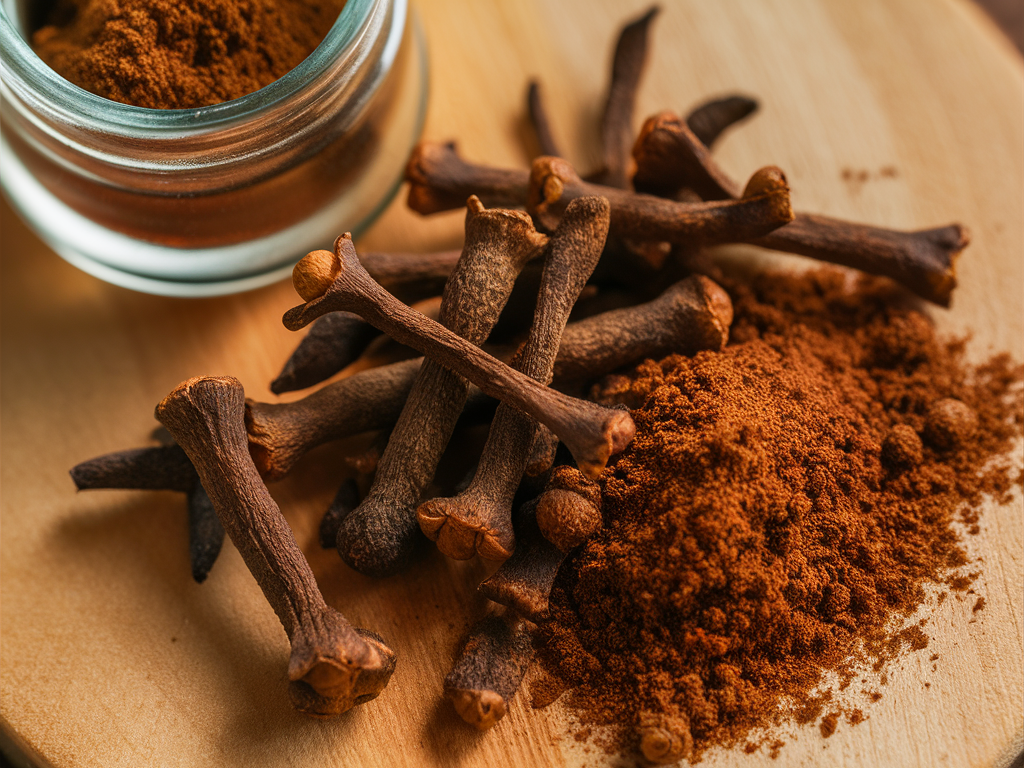Cloves, the aromatic flower buds of the Syzygium aromaticum tree, have been treasured for centuries not only for their distinctive flavor but also for their remarkable medicinal properties. These small, nail-shaped spices originate from the Maluku Islands in Indonesia and have a rich history dating back to ancient civilizations. Beyond their culinary applications, cloves offer a surprising array of health benefits that modern science continues to validate. Rich in essential nutrients, bioactive compounds, and powerful antioxidants, cloves deserve a prominent place in your spice cabinet for both their taste and therapeutic potential.
Benefit #1: Rich in Antioxidants
Cloves stand out as one of the most antioxidant-rich spices available, containing an impressive array of compounds that combat oxidative stress in the body. The primary antioxidant in cloves is eugenol, which constitutes approximately 72-90% of the essential oil. Additional antioxidants include flavonoids, isoflavones, and phenolic acids.
These powerful compounds neutralize free radicals – unstable molecules that damage cells and contribute to aging and disease development. The antioxidant activity works by donating electrons to free radicals, effectively stabilizing them and preventing cellular damage.
When compared to other antioxidant-rich foods, cloves consistently rank at the top. According to the ORAC (Oxygen Radical Absorbance Capacity) scale, which measures antioxidant capacity, cloves score over 290,000 units per 100 grams – significantly higher than other celebrated antioxidant foods like blueberries (approximately 9,600) and dark chocolate (approximately 20,000).

Benefit #2: Anti-Inflammatory Properties
Chronic inflammation underlies many modern diseases, from arthritis to heart disease. Cloves contain several compounds with potent anti-inflammatory effects, with eugenol again taking center stage. This compound inhibits the activity of cyclooxygenase-2 (COX-2), an enzyme involved in inflammatory responses.
Research published in the Journal of Immunotoxicology demonstrated that eugenol can suppress NF-?B activation, a key pathway in inflammatory processes. Another study in the Journal of Natural Products found that clove extract reduced inflammatory markers in laboratory tests comparable to some anti-inflammatory medications.
These properties make cloves potentially beneficial for conditions characterized by inflammation, including arthritis, inflammatory bowel disease, and certain cardiovascular conditions. Regular consumption of cloves or clove extracts may help modulate inflammatory responses in the body and reduce associated symptoms.
Benefit #3: Antibacterial and Antimicrobial Effects
Cloves have been used for centuries for their powerful antimicrobial properties, particularly in oral hygiene. The compounds in cloves, especially eugenol, demonstrate broad-spectrum antimicrobial activity against numerous pathogens, including E. coli, Staphylococcus aureus, and Candida albicans.
Traditional medicine has long employed cloves for dental issues, with clove oil being a time-honored remedy for toothaches. The active compounds penetrate the dental pulp, providing temporary pain relief while simultaneously fighting bacteria that cause dental infections. This traditional application has been validated by modern research, with studies confirming eugenol’s efficacy against oral pathogens.
Contemporary medicine continues to harness these properties, with clove derivatives appearing in dental products, mouthwashes, and throat lozenges. Some research indicates potential applications in food preservation as natural antimicrobial agents, addressing concerns about chemical preservatives in food products.
Benefit #4: Supports Digestive Health
Cloves have been valued in traditional Ayurvedic and Chinese medicine as digestive aids for centuries. The spice contains compounds that stimulate the secretion of digestive enzymes, potentially enhancing the breakdown of food and nutrient absorption.
Traditionally, cloves have been used to alleviate gas, bloating, indigestion, and nausea. In many cultures, chewing on a clove after meals is practiced to freshen breath and support digestion. The carminative properties of cloves help reduce intestinal gas and associated discomfort.
Scientific research supports these traditional applications. Studies have shown that clove extracts can increase gastric mucus production, potentially protecting the stomach lining from irritation. Research published in the Journal of Medicinal Food demonstrated that clove extract might help prevent gastric ulcers by preserving the integrity of the gastric mucosa. Additionally, cloves exhibit potential prebiotic effects, supporting beneficial gut bacteria that contribute to overall digestive health.
Benefit #5: Potential Blood Sugar Regulation
Emerging research suggests that cloves may play a beneficial role in managing blood glucose levels, making them potentially valuable for individuals with diabetes or at risk of developing the condition. Compounds in cloves appear to mimic insulin, helping facilitate the uptake of glucose into cells.
A study published in the Journal of Medicinal Food found that clove extract improved insulin function and helped lower blood glucose levels in animal models with diabetes. Human studies, while limited, show promising results. Research in the Journal of Ethnopharmacology demonstrated that consuming clove powder daily for 30 days significantly improved insulin sensitivity in people with type 2 diabetes.
To incorporate cloves for potential blood sugar benefits, consider adding ground cloves to morning oatmeal, smoothies, or tea. Alternatively, whole cloves can be included in cooking diabetic-friendly dishes like curries, stews, and spice rubs for meats. However, it’s important to note that cloves should complement, not replace, conventional diabetes treatments.

Benefit #6: May Improve Liver Health
The liver, our primary detoxification organ, can benefit significantly from the bioactive compounds found in cloves. Eugenol and other antioxidants in cloves demonstrate hepatoprotective (liver-protecting) properties that may help maintain liver function and prevent damage.
Research published in the Journal of Food Science showed that clove extract could protect liver cells from damage caused by toxic substances. Another study in BMC Complementary and Alternative Medicine found that clove extract helped normalize liver enzyme levels and reduce oxidative stress in the liver tissue of animals with liver damage.
The protective mechanisms appear to involve multiple pathways. Cloves enhance the activity of liver detoxification enzymes, particularly glutathione S-transferases, which help neutralize harmful compounds. Additionally, the antioxidants in cloves combat oxidative stress in liver tissue, potentially preventing cellular damage that could lead to fatty liver disease and other hepatic conditions.
Benefit #7: Bone Health Support
Cloves contain an impressive array of minerals essential for bone health, including manganese, calcium, and vitamin K. Just one teaspoon of ground cloves provides approximately 30% of the recommended daily intake of manganese, a mineral crucial for bone formation and maintenance.
Scientific investigation into cloves’ effects on bone health has yielded promising results. A study published in the Journal of Natural Products found that certain compounds in cloves could inhibit bone resorption – the process by which bone tissue is broken down, releasing minerals into the bloodstream. This property may help maintain bone density and reduce the risk of osteoporosis, particularly in postmenopausal women who are at higher risk for bone loss.
When compared to other bone-supporting foods, cloves offer a unique profile of nutrients and bioactive compounds. While dairy products provide calcium and leafy greens offer vitamin K, cloves contribute a concentrated source of manganese along with anti-inflammatory compounds that may reduce bone-damaging inflammation. Including cloves as part of a balanced diet rich in other bone-supporting foods can contribute to comprehensive skeletal health.
Benefit #8: Potential Cancer-Fighting Properties
The bioactive compounds in cloves demonstrate promising anticancer potential in preliminary research. Eugenol, oleanolic acid, and other phenolic compounds exhibit anticarcinogenic properties through multiple mechanisms, making cloves an intriguing subject in cancer research.
Laboratory studies have shown that clove extracts can induce apoptosis (programmed cell death) in various cancer cell lines, including breast, colorectal, and prostate cancer cells. Research published in the journal Oncology Reports demonstrated that eugenol from cloves inhibited the growth of breast cancer cells without affecting normal breast tissue cells. Additional studies suggest that compounds in cloves may help prevent the development of cancer by protecting DNA from damage and inhibiting enzymes involved in carcinogen activation.
While these findings are promising, it’s important to acknowledge the limitations of current research. Most studies have been conducted in laboratory settings using cell cultures or animal models. Human clinical trials are limited, making it premature to claim cloves as a cancer treatment. However, the existing evidence suggests that including cloves in a balanced diet may contribute to a comprehensive cancer prevention strategy.
Benefit #9: Immune System Boost
Cloves offer an impressive nutritional profile that supports immune function. They contain significant amounts of vitamin C, manganese, and vitamin K, along with minerals like calcium and magnesium – all essential nutrients for maintaining immune resilience. The antioxidant compounds in cloves, particularly eugenol, also contribute to immune health by combating oxidative stress that can weaken immune response.
The antimicrobial properties of cloves make them particularly effective against pathogens that cause common infections. Research has shown that clove extracts can inhibit the growth of multiple strains of bacteria, including those responsible for respiratory and intestinal infections. Additionally, some studies suggest that compounds in cloves may enhance the activity of white blood cells, the body’s primary defense against infections.
Cloves are especially valuable during cold and flu season. A warming tea made with cloves, cinnamon, and ginger can help soothe a sore throat while delivering immune-supporting compounds. Adding ground cloves to seasonal dishes not only enhances flavor but may also provide an immune boost during vulnerable periods. Some traditional practices involve creating a spice mixture with cloves for use in steam inhalation to relieve congestion and support respiratory health.

Benefit #10: Pain-Relieving Properties
Perhaps one of the most well-known traditional uses of cloves is for pain relief, particularly for dental pain. Throughout history, clove oil has been applied directly to aching teeth and gums to provide rapid, albeit temporary, relief from toothaches. This folk remedy has persisted across cultures and generations because of its remarkable effectiveness.
The analgesic (pain-relieving) effects of cloves stem primarily from eugenol, which has been shown to inhibit pain receptors and block nerve transmission of pain signals. Eugenol also demonstrates local anesthetic properties similar to those of benzocaine, temporarily numbing the area where it’s applied. These properties have been confirmed in multiple scientific studies, validating the traditional uses.
Modern medicine continues to utilize cloves’ pain-relieving properties. Dental products containing eugenol are commonly used in professional dentistry for temporary fillings and pain management. Research is also exploring broader applications for eugenol in pain management, including its potential use in topical formulations for muscle pain, arthritis, and headaches. Some studies suggest that regular consumption of cloves may contribute to reduced inflammatory pain through systemic anti-inflammatory effects.
Conclusion
Cloves offer an impressive array of evidence-based health benefits, from their exceptional antioxidant content to their potential role in managing chronic conditions like diabetes and inflammation. These small, aromatic spice buds deliver a powerful punch of bioactive compounds with far-reaching health implications.
To incorporate cloves into your diet, consider adding ground cloves to baked goods, sprinkling them into coffee or tea, using them in marinades for meat and poultry, or including whole cloves in simmering soups and stews. For therapeutic purposes, clove tea can be prepared by steeping a few whole cloves in hot water for 5-10 minutes. However, moderation is key – cloves have a potent flavor and should be used sparingly in cooking.
While cloves offer numerous health benefits, some cautions are warranted. Concentrated clove oil should never be consumed internally without professional guidance, as it can cause liver damage in excessive amounts. Individuals taking blood-thinning medications should consult with healthcare providers before significantly increasing clove consumption, as compounds in cloves may enhance anticoagulant effects. Pregnant women should use cloves in food amounts only, avoiding medicinal quantities.
As research continues to validate traditional wisdom about this ancient spice, cloves deserve recognition not just as a flavorful culinary ingredient but as a functional food with significant health-promoting properties. By incorporating moderate amounts of cloves into a balanced diet, you can enjoy their distinctive flavor while potentially supporting your overall health and wellbeing.

